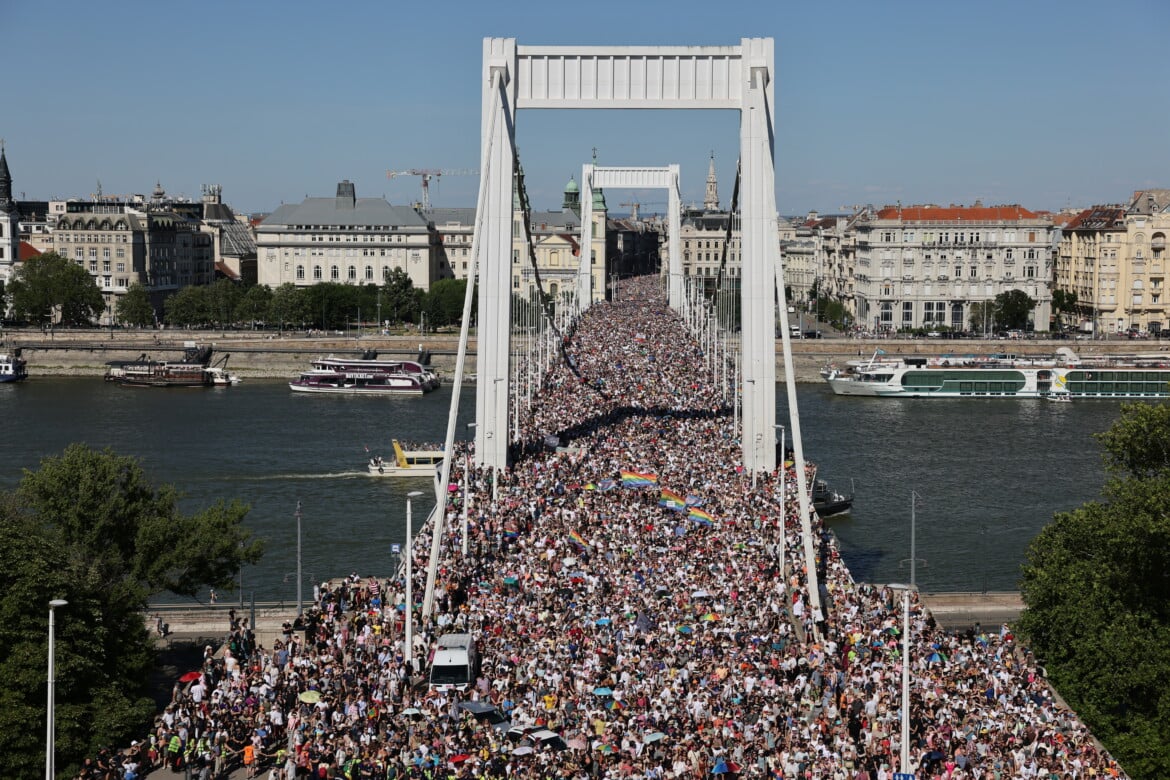Reportage
Pride comes to Budapest, despite Orbán
Hundreds of thousands marched through Budapest Saturday in the 30th edition of the parade. ‘The fact that our government banned Pride makes what is happening in Hungary emblematic. Being part of such a huge march today makes me feel stronger.’

A slap in the face for Viktor Orbán in the name of civil rights and freedom of assembly: this is what unfolded on Saturday afternoon on Budapest’s streets, where about 200,000 people, according to organizers, marched in the 30th edition of Budapest Pride.
After repeated threats by the government against organizers, the city’s mayor and participants, not a single incident or moment of tension occurred. Yet provocations did arise. Three small counter-rallies were staged by nationalist, homophobic far-right groups whose only goal was to obstruct the rainbow parade. All three gatherings obtained full police permits, as expected in Orbán’s Hungary, whereas Pride had to resort to a workaround by the municipality to be able to occupy public space.
In the capital’s streets people danced, kissed, hugged and held hands. Bella ciao mixed with Hungarian protest songs amid a torrent of rainbow, EU and Hungarian flags, often sewn together into multicolour standards, plus countless banners, placards and the ever-popular masks of Orbán as the Joker.
Every so often, a cheer went up from the marchers whenever someone leaning from a window applauded or waved rainbow flags. Passing cruise ships on the Danube answered with foghorns. Party symbols were almost entirely absent, although two opposition movements – Momentum and the satirical Two-Tailed Dog Party – fielded their own floats, with Tilos Radio, one of the few non-Orbán-friendly broadcasters still operating, also joining in.
Among the marchers, one could hear Hungarian mixed with English, Italian, German, French, Czech and Polish, with participants of every generation. Twenty-year-old Zsófia, at her third Pride, felt a new weight this year: “The fact that our government banned Pride makes what is happening in Hungary emblematic. Being part of such a huge march today makes me feel stronger.”
Ann from Germany clutched a rainbow flag reading “For Maja,” honouring the non-binary anti-fascist jailed in Budapest: “I am here for them, because Maja T. would be with us today if they were not in prison. I want there to be greater awareness of their situation and I want people to know about the hunger strike they are now on. They were deported here illegally from Germany, and that makes me angry, because they are losing their rights in this country.”
Hungarian police were numerous yet discreet, keeping to the side roads. The only verbal clash came in Gellért Square beside the famous baths, where about 20 black-clad extremists, shielded by a hundred officers, unfurled a banner reading “Stop LGBT pedophilia,” echoing Orbán’s rhetoric.
The authorities later quarreled with the Pride organizers in a statement issued while the march was still under way, claiming they had not been told of route changes. Those changes were forced by anti-Pride activists who blocked Liberty Bridge, forcing organizers – backed by two hundred volunteers – to divert the parade over nearby Elizabeth Bridge. That blockade proved the only real obstacle, save for a trio of zealots brandishing a cross and shouting “Repent! While you still have time,” a sermon greeted with smiles and ironic applause.
From Brussels came many politicians, including the leaders of the S&D, Greens and Liberals. Former Barcelona mayor Ada Colau was spotted wrapped in a keffiyeh. Apart from a few stickers and body-painted slogans, Palestine was largely not on the radar in Budapest.
The Italian presence made itself loudly heard, with drums, chants and flags, including around a hundred activists from numerous LGBTQ+ associations. Arcigay secretary-general Gabriele Piazzoni said: “We are firmly convinced that civil rights know no borders, and when an EU member state puts the fundamental principles on which the EU was built into question, we must rise in defense and support of Hungary’s LGBTQ+ movement.”
Democratic Party leader Elly Schlein echoed him: “The Pride ban is censorship and institutional discrimination. We cannot accept it, and that is why we have decided to be here.”
Green-Left Alliance co-leader Angelo Bonelli added that Pride “is a battle for freedom against authoritarianism, and we stand with everyone who fights for equality against every form of discrimination.”
Five Star Movement representatives, a +Europa delegation and Carlo Calenda also marched, the latter at ease amid EU flags and anti-Orbán chants, on a rare day without any internal clashes among the broad Italian opposition camp.
There was only deafening silence from Prime Minister Orbán in the hours after the parade. He eventually posted a photo of his three grandchildren picking flowers in a meadow, captioned “Proud of them.” Soon he will have to leave that idyllic fantasy land and reckon with the message coming from Budapest’s streets. How he responds to Saturday’s signals will significantly affect his chances of remaining in power in Hungary.
Originally published at https://ilmanifesto.it/pride-di-budapest-e-qui-la-festa-nonostante-orban on 2025-06-29
